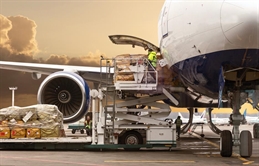
The International Air Transport Association (IATA) released data for global air freight markets for January, showing that air cargo demand declined in the first month of 2023 as economic headwinds persisted.
Global demand, measured in cargo tonne-kilometres (CTKs), was down 14.9% in January compared to the same period in 2022.
For the full-year 2022, IATA earlier already reported an 8.0% decline in global air freight which is a significant step back from 2021 levels but was close to 2019 performance.
Cautious optimism for air cargo in 2023
In a statement, IATA said in January 2023, capacity — measured in available cargo tonne-kilometres (ACTK) — was up 3.9% compared to January 2022.
IATA said this was the first year-on-year growth in capacity since October 2022. For the period, international cargo capacity increased by 1.4% compared to January 2022.
The trade association of the world's airlines said the uptick in ACTKs reflects the strong recovery of belly capacity in passenger airline markets, offsetting a decline in international capacity offered by dedicated freighters.
"With January cargo demand down 14.9% and capacity up 3.9%, 2023 began under some challenging business conditions. That was accompanied by persistent uncertainties, including the war in Ukraine, inflation, and labour shortages," said Willie Walsh, IATA's director-general.
"But there is solid ground for some cautious optimism about air cargo," he added, noting that yields remain higher than pre-pandemic.
"China's much-faster-than-expected shift from its zero COVID policy is stabilizing production conditions in air cargo's largest source market. That will give a much-needed demand boost as companies increase their engagement with China," the IATA director general said.
Regional performance
For January 2023, IATA said Asia-Pacific airlines saw their air cargo volumes decrease by 19% year-on-year, although an improvement in performance compared to the 21.2% drop seen in December.
"Airlines in the region continue to be impacted by lower levels of trade and manufacturing activity and disruptions in supply chains due to the residual effects of COVID restrictions that were imposed by China. Additionally, the positioning of the Lunar New Year would have impacted cargo volumes in January," IATA said in a statement, adding that available capacity in the region increased by 8.8% compared to January 2022.
North American carriers posted an 8.7% decrease in cargo volumes compared to the same month January period in 2022 — a slight decrease in performance compared to December's -8.5%.
European carriers, meanwhile, saw the weakest performance of all regions, with a 20.4% decrease in cargo volumes in January 2023 compared to the same month in 2022. This was a further decrease in performance compared to the 19.4% decline recorded in December.
IATA said airlines in the region continue to be most affected by the war in Ukraine. Unlike other regions, capacity in Europe was also down 9.3%.
IATA said Middle Eastern carriers experienced an 11.8% year-on-year decrease in cargo volumes in January, an improvement to the previous month's -14.4% decline. Capacity in the region was up 9.6% compared to January 2022.
Latin American carriers reported a 4.6% increase in cargo volumes in January compared to the same period in 2022.
IATA said this was the "strongest performance" of all regions and a significant improvement in performance compared to December, which saw no growth. Capacity in the region was also up 34.4% year-on-year.
African airlines saw cargo volumes decrease by 9.5% in January 2023 compared to January 2022. IATA noted that this was an improvement in performance compared to the previous month's decline of 10%.



